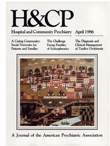Long-Term Outcome of Network Therapy
Abstract
Hospital utilization by crisisridden chronic mentally ill persons living in the community was studied after their participation in a network therapy program, which convenes a social network of relatives and friends to provide continuing emotional and practical support for mentally ill individuals and their families. The study compared the number of psychiatric hospitalizations and total days hospitalized for 20 network therapy participants and 20 nonparticipants before and after referral to the program. In a follow-up period ranging from six months to two years, the number of hospitalizations fell by 74 percent for participants and by 19 percent for nonparticipants. The total number of days hospitalized decreased by 76 percent for participants, compared with a 112 percent increase for nonparticipants. The results suggest that participants benefit from network therapy and that its effect is enduring.
Access content
To read the fulltext, please use one of the options below to sign in or purchase access.- Personal login
- Institutional Login
- Sign in via OpenAthens
- Register for access
-
Please login/register if you wish to pair your device and check access availability.
Not a subscriber?
PsychiatryOnline subscription options offer access to the DSM-5 library, books, journals, CME, and patient resources. This all-in-one virtual library provides psychiatrists and mental health professionals with key resources for diagnosis, treatment, research, and professional development.
Need more help? PsychiatryOnline Customer Service may be reached by emailing [email protected] or by calling 800-368-5777 (in the U.S.) or 703-907-7322 (outside the U.S.).



